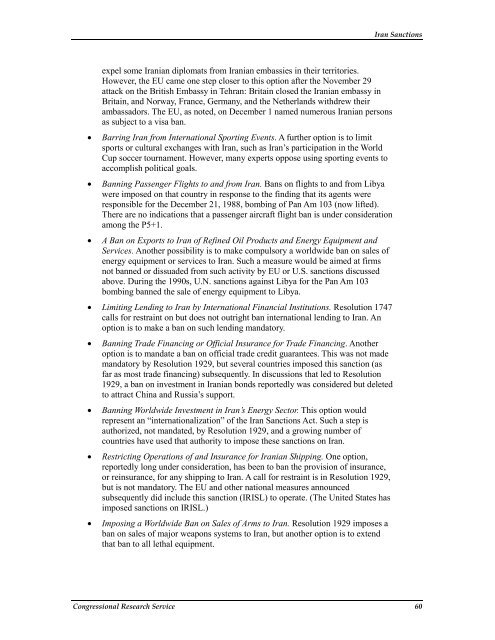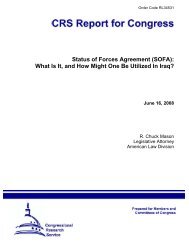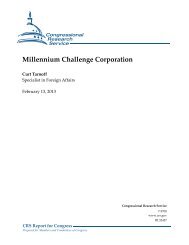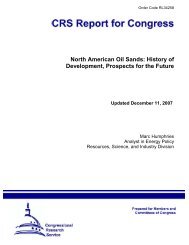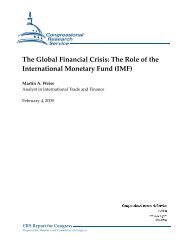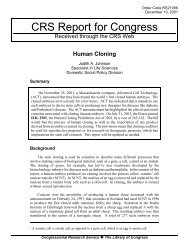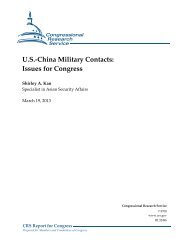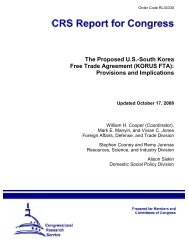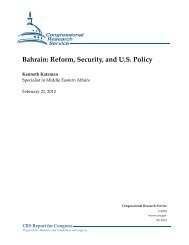Iran Sanctions - Foreign Press Centers
Iran Sanctions - Foreign Press Centers
Iran Sanctions - Foreign Press Centers
Create successful ePaper yourself
Turn your PDF publications into a flip-book with our unique Google optimized e-Paper software.
expel some <strong>Iran</strong>ian diplomats from <strong>Iran</strong>ian embassies in their territories.<br />
However, the EU came one step closer to this option after the November 29<br />
attack on the British Embassy in Tehran: Britain closed the <strong>Iran</strong>ian embassy in<br />
Britain, and Norway, France, Germany, and the Netherlands withdrew their<br />
ambassadors. The EU, as noted, on December 1 named numerous <strong>Iran</strong>ian persons<br />
as subject to a visa ban.<br />
• Barring <strong>Iran</strong> from International Sporting Events. A further option is to limit<br />
sports or cultural exchanges with <strong>Iran</strong>, such as <strong>Iran</strong>’s participation in the World<br />
Cup soccer tournament. However, many experts oppose using sporting events to<br />
accomplish political goals.<br />
• Banning Passenger Flights to and from <strong>Iran</strong>. Bans on flights to and from Libya<br />
were imposed on that country in response to the finding that its agents were<br />
responsible for the December 21, 1988, bombing of Pan Am 103 (now lifted).<br />
There are no indications that a passenger aircraft flight ban is under consideration<br />
among the P5+1.<br />
• A Ban on Exports to <strong>Iran</strong> of Refined Oil Products and Energy Equipment and<br />
Services. Another possibility is to make compulsory a worldwide ban on sales of<br />
energy equipment or services to <strong>Iran</strong>. Such a measure would be aimed at firms<br />
not banned or dissuaded from such activity by EU or U.S. sanctions discussed<br />
above. During the 1990s, U.N. sanctions against Libya for the Pan Am 103<br />
bombing banned the sale of energy equipment to Libya.<br />
• Limiting Lending to <strong>Iran</strong> by International Financial Institutions. Resolution 1747<br />
calls for restraint on but does not outright ban international lending to <strong>Iran</strong>. An<br />
option is to make a ban on such lending mandatory.<br />
• Banning Trade Financing or Official Insurance for Trade Financing. Another<br />
option is to mandate a ban on official trade credit guarantees. This was not made<br />
mandatory by Resolution 1929, but several countries imposed this sanction (as<br />
far as most trade financing) subsequently. In discussions that led to Resolution<br />
1929, a ban on investment in <strong>Iran</strong>ian bonds reportedly was considered but deleted<br />
to attract China and Russia’s support.<br />
• Banning Worldwide Investment in <strong>Iran</strong>’s Energy Sector. This option would<br />
represent an “internationalization” of the <strong>Iran</strong> <strong>Sanctions</strong> Act. Such a step is<br />
authorized, not mandated, by Resolution 1929, and a growing number of<br />
countries have used that authority to impose these sanctions on <strong>Iran</strong>.<br />
• Restricting Operations of and Insurance for <strong>Iran</strong>ian Shipping. One option,<br />
reportedly long under consideration, has been to ban the provision of insurance,<br />
or reinsurance, for any shipping to <strong>Iran</strong>. A call for restraint is in Resolution 1929,<br />
but is not mandatory. The EU and other national measures announced<br />
subsequently did include this sanction (IRISL) to operate. (The United States has<br />
imposed sanctions on IRISL.)<br />
• Imposing a Worldwide Ban on Sales of Arms to <strong>Iran</strong>. Resolution 1929 imposes a<br />
ban on sales of major weapons systems to <strong>Iran</strong>, but another option is to extend<br />
that ban to all lethal equipment.<br />
<strong>Iran</strong> <strong>Sanctions</strong><br />
Congressional Research Service 60


